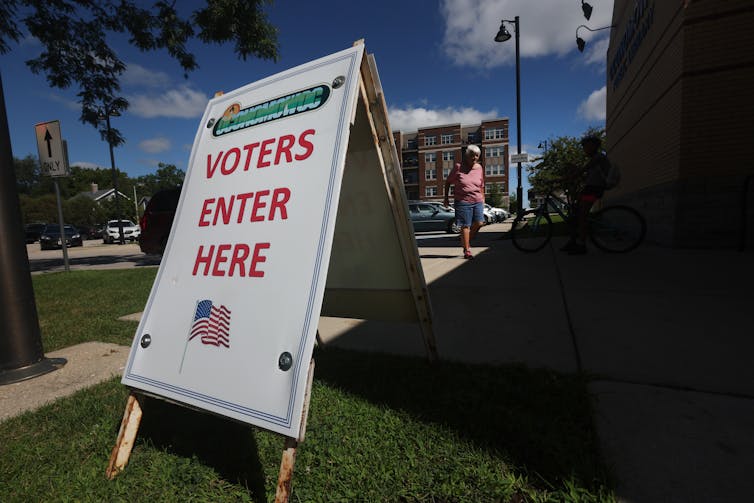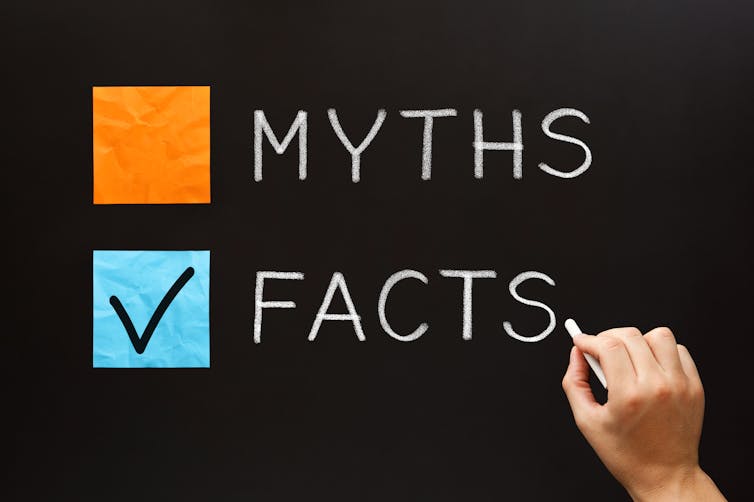
By Ian Anson
As statewide primaries continue through the summer, many Americans are beginning to think about which candidates they will support in the 2022 general election.
This decision-making process is fraught with difficulties, especially for inexperienced voters.
Voters must navigate angry, emotion-laden conversations about politics when trying to sort out whom to vote for. Americans are more likely than ever to view politics in moral terms, meaning their political conversations sometimes feel like epic battles between good and evil.
But political conversations are also shaped by, obviously, what Americans know – and, less obviously, what they think they know – about politics.
In recent research, I studied how Americans’ perceptions of their own political knowledge shape their political attitudes. My results show that many Americans think they know much more about politics than they really do.

Scott Olson/Getty Images
Knowledge deficit, confidence surplus
Over the past five years, I have studied the phenomenon of what I call “political overconfidence.” My work, in tandem with other researchers’ studies, reveals the ways it thwarts democratic politics.
Political overconfidence can make people more defensive of factually wrong beliefs about politics. It also causes Americans to underestimate the political skill of their peers. And those who believe themselves to be political experts often dismiss the guidance of real experts.
Political overconfidence also interacts with political partisanship, making partisans less willing to listen to peers across the aisle.
The result is a breakdown in the ability to learn from one another about political issues and events.
A ‘reality check’ experiment
In my most recent study on the subject, I tried to find out what would happen when politically overconfident people found out they were mistaken about political facts.
To do this, I recruited a sample of Americans to participate in a survey experiment via the Lucid recruitment platform. In the experiment, some respondents were shown a series of statements that taught them to avoid common political falsehoods. For instance, one statement explained that while many people believe that Social Security will soon run out of money, the reality is less dire than it seems.
My hypothesis was that most people would learn from the statements, and become more wary of repeating common political falsehoods. However, as I have found in my previous studies, a problem quickly emerged.
The problem
First, I asked respondents a series of basic questions about American politics. This quiz included topics like which party controls the House of Representatives – the Democrats – and who the current Secretary of Energy is – Jennifer Granholm. Then, I asked them how well they thought they did on the quiz.
Many respondents who believed they were top performers were actually among those who scored the worst. Much akin to the results of a famous study by Dunning and Kruger, the poorest performers did not generally realize that they lagged behind their peers.
Of the 1,209 people who participated, around 70% were overconfident about their knowledge of politics. But this basic pattern was not the most worrying part of the results.
The overconfident respondents failed to change their attitudes in response to my warnings about political falsehoods. My investigation showed that they did read the statements, and could report details about what they said. But their attitudes toward falsehoods remained inflexible, likely because they – wrongly – considered themselves political experts.
But if I could make overconfident respondents more humble, would they actually take my warnings about political falsehoods to heart?
Poor self-assessment
My experiment sought to examine what happens when overconfident people are told their political knowledge is lacking. To do this, I randomly assigned respondents to receive one of three experimental treatments after taking the political knowledge quiz. These were as follows:
- Respondents received statements teaching them to avoid political falsehoods.
- Respondents did not receive the statements.
- Respondents received both the statements and a “reality check” treatment. The reality check showed how respondents fared on the political quiz they took at the beginning of the survey. Along with their raw score, the report showed how respondents ranked among 1,000 of their peers.
For example, respondents who thought they had aced the quiz might have learned that they got one out of five questions right, and that they scored worse than 82% of their peers. For many overconfident respondents, this “reality check” treatment brought them down to earth. They reported much less overconfidence on average when I followed up with them.
Finally, I asked all the respondents in the study to report their levels of skepticism toward five statements. These statements are all common political falsehoods. One statement, for example, asserted that violent crime had risen over the prior decade – it hadn’t. Another claimed the U.S. spent 18% of the federal budget on foreign aid – the real number was less than 1%.
I expected most respondents who had received my cautionary statements to become more skeptical of these misinformed statements. On average, they did. But did overconfident respondents learn this lesson too?

IvelinRadkov/iStock/Getty Images
Reality check: Mission accomplished
The results of the study showed that overconfident respondents began to take political falsehoods seriously only if they had experienced my “reality check” treatment first.
While overconfident respondents in other conditions showed no reaction, the humbling nature of the “reality check,” when they realized how wrong they had been, led overconfident participants in that condition to revise their beliefs. They increased their skepticism of political falsehoods by a statistically significant margin.
Overall, this “reality check” experiment was a success. But it reveals that outside of the experiment, political overconfidence stands in the way of many Americans’ ability to accurately perceive political reality.
The problem of political overconfidence
What, if anything, can be done about the widespread phenomenon of political overconfidence?
While my research cannot determine whether political overconfidence is increasing over time, it makes intuitive sense that this problem would be growing in importance in an era of online political discourse. In the online realm, it is often difficult to appraise the credibility of anonymous users. This means that false claims are easily spread by uninformed people who merely sound confident.
To combat this problem, social media companies and opinion leaders could seek ways to promote discourse that emphasizes humility and self-correction. Because confident, mistaken self-expression can easily drown out more credible voices in the online realm, social media apps could consider promoting humility by reminding posters to reconsider the “stance,” or assertiveness, of their posts.
While this may seem far-fetched, recent developments show that small nudges can lead to powerful shifts in social media users’ online behavior.
For example, Twitter’s recent inclusion of a pop-up message that asks would-be posters of news articles to “read before tweeting” caused users to rethink their willingness to share potentially misleading content.
A gentle reminder to avoid posting bold claims without evidence is just one possible way that social media companies could encourage good online behavior. With another election season soon upon us, such a corrective is urgently needed.
![]()
Ian Anson is Associate Professor of Political Science at the University of Maryland, Baltimore County.





























Anonymous says
Just because alot of us don’t believe the lies and propaganda doesn’t mean we don’t know about democracy.
Jim says
This is a very interesting article. It’s not surprising that many people do lack knowledge of political issues and at the same time believe they really know more than they do. It’s also encouraging that people can change their behavior once they realize they have been missing key facts through mistaken beliefs.
On the bright side here, the defeat of Joe Mullins, Jill Woolbright and Janet McDonald in the recent primaries indicate that bad behavior at the local level gets recognized by most people. This gives me hope that our county, state and country can bounce back from the recent surge of anger-driven politics and return to a more even level of discourse leading to moving forward instead of backward.
Burgess says
I have been voting since I was 18 and in the Navy. Now I’m an old man who can barely walk or have enough food to eat. Have no one to help me cut my grass or weedeat around the yard. I had 4 heart attacks and have 8 stents implanted in my coronary arteries. My body is riddled with rheumatoid arthritis . My eyes are so bad I can’t drive at night. My A/C system has been broke for 2 years (try getting thru the day in a house that’s 90 degrees.) My right knee is fractured. My left foot has some kind of Bunion the size of Mt. Rushmore on the side near the little toe……………………….
Now I ask you, do you really freaking think I give a RATS ASS who sits in the White House and pretends to be in charge of this country ? I am neither Republican or Democrat…. I am what you call a Constitutionist . This country is run by the wealthy DEEP STATE and the Underground Black Ops Cartel Government. Climate getting VERY BAD and will continue on that track. HOTTER Summers and Shorter Winters. Less Fresh water and possibly NO WATER for the West coast and neighboring states. Mass electric BLACKOUTS coming. Crime is at a DISGUSTING SUB-HUMAN level and the DOJ and FBI along with all the democratic Governers releasing criminals for their “WOKE” attitudes is DESTROYING America. 2 million illegal aliens from our southern borders allowed in with almost 1 million others that “GOT AWAY” from the Border Patrol will very shortly become a Cartel of Criminals that will take over 100’s of cities………
I don’t need to know anything else about “Politics”. Its a JOKE and a SCAM…………….We need is a REVOLUTION again !!!!!
Timothy Patrick Welch says
Navy guy, Deep State, Black Operations, woke cities, the war on drugs, too many laws, too many criminals, and our climate is in constant change…Yep
If you would like some help with your yard, let’s connect.
And Justice for All says
Mr Burgess, having served in US armed forces, are you saying that you have all these physical and financial issues and you’re not getting support or treatment ? Something wrong there and you should have the support that is rightfully owed by this country. While you mention that you have no political affiliation , your chosen language hits a very specific target. The populist leader of this “political” group is a person who only wants two things, more money and power. Even if this means selling state secrets he will do what he thinks is best for him, lying and insulting along the way.
Geezer says
Wow, that’s a lot of info. Let’s see that bunion!
Dennis C Rathsam says
God bless you Burgess. the golden years aint so golden….and your right, The future isnt that bright sa it used to be!
Geezer says
I asked a MAGA guy if he knew what the president’s Cabinet is…
He replied: “Well yeah—that’s where he keeps his stuff.”
I’m not kidding.
Laurel says
Good article. I want to add here that I have had a real, new understanding why we do what we do, and why we are so divided. First of all, we need to stop calling each other names, such as “libtards” or “magats” and learn what is really going on. This division is intentional, and working for a few and against the majority.
I love Frontline, which has some of the best reporting possible. I found a Frontline series called “America’s Great Divide” which interviews different people, some of whom were involved in polling, and strategy in the past elections. What an eye opener!
Do yourselves a favor and look this up on YouTube. Start with Robert Reich’s interview even if it’s the only one you watch. It doesn’t matter if you are Republican, Democrat or No Party Affiliated. Clear your mind, step back, and see how both far ends of the spectrum want the same thing: to be listened to, and see how we are being manipulated to the advantage of a few.
I’ll post this again, when there is more readers because that’s how important I believe this to be.